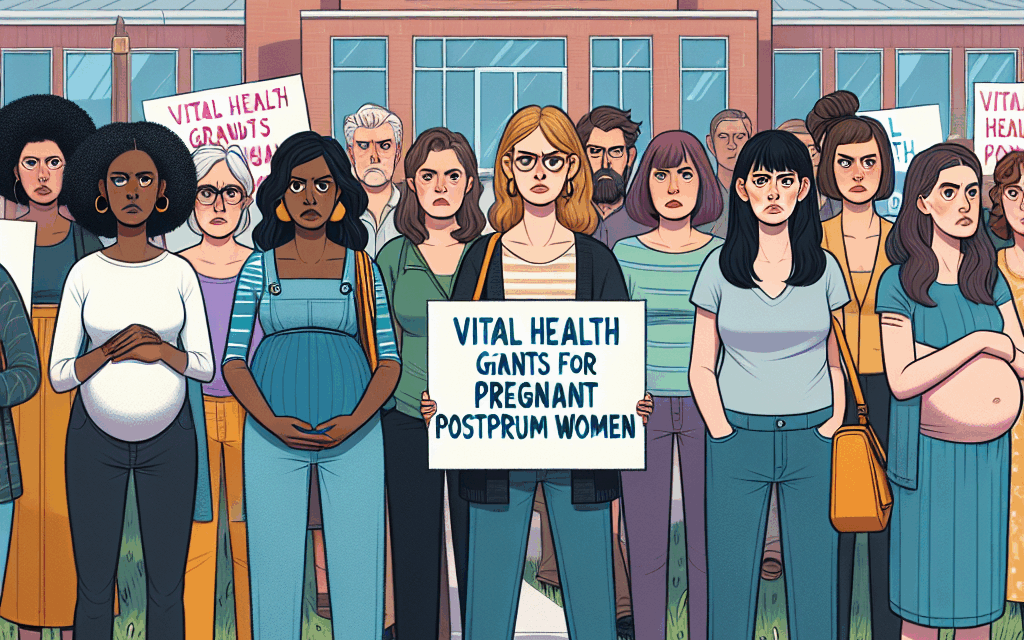Federal Cuts Endanger Vital Health Grant for Pregnant and Postpartum Women in Colorado
The health and well-being of pregnant and postpartum women are critical to the future of families and communities. In Colorado, a federal grant program has played a vital role in supporting these women, providing essential services that ensure healthy pregnancies and successful transitions into motherhood. However, recent federal budget cuts threaten to undermine these programs, putting the health of mothers and their children at risk. This article explores the implications of these cuts, the importance of health grants, and the potential consequences for pregnant and postpartum women in Colorado.
The Importance of Health Grants for Pregnant and Postpartum Women
Health grants are essential for providing comprehensive care to pregnant and postpartum women. These grants fund a variety of services, including prenatal care, mental health support, nutritional counseling, and education on childbirth and parenting. The importance of these services cannot be overstated, as they directly impact maternal and infant health outcomes.
According to the Centers for Disease Control and Prevention (CDC), maternal mortality rates in the United States have been rising, with significant disparities among different racial and ethnic groups. In Colorado, the maternal mortality rate is approximately 18.5 deaths per 100,000 live births, which is higher than the national average. Health grants help address these disparities by providing targeted support to vulnerable populations.
- Access to Prenatal Care: Health grants ensure that pregnant women have access to essential prenatal care services, which are crucial for monitoring the health of both mother and baby. Early and regular prenatal visits can help identify potential complications, allowing for timely interventions.
- Mental Health Support: Pregnancy and the postpartum period can be challenging for many women, leading to mental health issues such as postpartum depression. Health grants fund mental health services that provide counseling and support, helping women navigate these challenges.
- Nutritional Counseling: Proper nutrition during pregnancy is vital for the health of both mother and child. Health grants often include programs that offer nutritional counseling and education, helping women make informed dietary choices.
- Education and Resources: Health grants provide educational resources that empower women with knowledge about childbirth, breastfeeding, and parenting. This education is essential for promoting healthy practices and reducing anxiety during the transition to motherhood.
- Community Support: Many health grant programs foster community support networks, connecting pregnant and postpartum women with peers and resources. This sense of community can be invaluable in reducing feelings of isolation and promoting mental well-being.
The Impact of Federal Cuts on Health Grants
In recent years, federal budget cuts have targeted various health programs, including those that support pregnant and postpartum women. These cuts have significant implications for the availability and quality of services provided through health grants in Colorado.
One of the most affected areas is funding for the Maternal and Child Health Services Block Grant, which provides essential resources for states to implement programs that support maternal and child health. In Colorado, this funding has been instrumental in reducing maternal and infant mortality rates and improving overall health outcomes.
With federal cuts, Colorado faces the challenge of maintaining these critical services. The state may be forced to make difficult decisions about which programs to prioritize, potentially leading to reduced access to care for many women. For example, programs that provide mental health support or nutritional counseling may be scaled back or eliminated altogether.
- Reduced Access to Care: As funding decreases, many health programs may have to limit their services or increase fees, making it more difficult for low-income women to access care.
- Increased Health Disparities: Federal cuts disproportionately affect marginalized communities, exacerbating existing health disparities among pregnant and postpartum women of color and those living in rural areas.
- Strain on Healthcare Providers: Healthcare providers may experience increased strain as they attempt to serve a growing number of patients with fewer resources, potentially leading to burnout and decreased quality of care.
- Long-Term Consequences: The impact of reduced funding may not be immediately visible but can have long-term consequences for maternal and child health, including increased rates of complications during pregnancy and childbirth.
- Community Programs at Risk: Local organizations that rely on federal funding to provide support services may face closure or significant cutbacks, leaving many women without essential resources.
Case Studies: The Real-Life Impact of Funding Cuts
To understand the real-life implications of federal cuts on health grants for pregnant and postpartum women, it is essential to examine specific case studies that highlight the challenges faced by individuals and communities in Colorado.
One notable case is that of a low-income mother living in Denver who relied on a local health program funded by the Maternal and Child Health Services Block Grant. This program provided her with access to prenatal care, mental health support, and nutritional counseling throughout her pregnancy. However, due to recent federal cuts, the program faced significant budget reductions, leading to longer wait times for appointments and a decrease in available services.
As a result, this mother experienced increased anxiety during her pregnancy, as she struggled to access the care she needed. The lack of mental health support exacerbated her feelings of isolation, and she found it challenging to connect with other mothers in her community. Ultimately, the cuts not only affected her health but also the health of her baby, as she was unable to receive timely interventions for potential complications.
Another case study involves a rural community in Colorado that has historically faced challenges in accessing healthcare services. A local health grant program provided essential resources for pregnant women, including transportation assistance to prenatal appointments and educational workshops on childbirth. However, with federal funding cuts, the program was forced to eliminate transportation services, leaving many women without a way to reach healthcare providers.
This situation highlights the critical role that health grants play in addressing barriers to care, particularly in underserved areas. Without these programs, pregnant women in rural communities may face significant challenges in accessing the care they need, leading to poorer health outcomes for both mothers and infants.
- Increased Anxiety and Stress: The inability to access necessary services can lead to heightened anxiety and stress for pregnant women, impacting their overall well-being.
- Compromised Health Outcomes: Delays in receiving care can result in complications during pregnancy and childbirth, ultimately affecting the health of both mother and child.
- Community Disconnection: The loss of local health programs can lead to a sense of disconnection among mothers, reducing opportunities for peer support and shared experiences.
- Long-Term Health Implications: The consequences of inadequate care during pregnancy can extend beyond childbirth, affecting the long-term health of both mothers and children.
- Need for Advocacy: These case studies underscore the importance of advocacy efforts to protect funding for health grants and ensure that pregnant and postpartum women have access to the care they need.
Advocacy Efforts to Protect Health Grants
In light of the challenges posed by federal cuts, advocacy efforts are crucial to protect health grants for pregnant and postpartum women in Colorado. Various organizations, including local nonprofits, healthcare providers, and community groups, are working tirelessly to raise awareness about the importance of these programs and the potential consequences of funding reductions.
One effective strategy has been to mobilize community members to share their stories and experiences with policymakers. Personal narratives can be powerful tools for illustrating the real-life impact of funding cuts and the importance of health grants. By highlighting the experiences of mothers who have benefited from these programs, advocates can create a compelling case for continued support.
Additionally, advocacy groups are working to educate policymakers about the long-term benefits of investing in maternal and child health. Research has shown that every dollar spent on maternal and child health programs yields significant returns in terms of improved health outcomes and reduced healthcare costs. By framing the conversation around the economic benefits of these programs, advocates can appeal to a broader audience and garner support for continued funding.
- Community Engagement: Engaging community members in advocacy efforts can amplify voices and create a sense of collective responsibility for maternal and child health.
- Collaboration with Healthcare Providers: Partnering with healthcare providers can strengthen advocacy efforts, as they can provide valuable insights and data on the impact of funding cuts on patient care.
- Utilizing Social Media: Social media platforms can be powerful tools for raising awareness and mobilizing support for advocacy campaigns, allowing organizations to reach a wider audience.
- Building Coalitions: Forming coalitions with other organizations focused on maternal and child health can enhance advocacy efforts and create a unified front in the fight for funding.
- Engaging Policymakers: Directly engaging with policymakers through meetings, letters, and public testimony can help ensure that the voices of pregnant and postpartum women are heard in the decision-making process.
The Future of Maternal and Child Health in Colorado
The future of maternal and child health in Colorado hangs in the balance as federal cuts threaten vital health grants for pregnant and postpartum women. The implications of these cuts are far-reaching, affecting not only individual women and families but also the overall health of communities across the state.
As advocates continue to fight for funding, it is essential to recognize the importance of investing in maternal and child health programs. The evidence is clear: when women have access to comprehensive care during pregnancy and the postpartum period, the benefits extend beyond individual families to society as a whole. Healthy mothers lead to healthy children, which ultimately contributes to stronger communities and a more robust economy.
Moving forward, it is crucial for stakeholders at all levels—government officials, healthcare providers, community organizations, and individuals—to come together to advocate for the protection and expansion of health grants for pregnant and postpartum women. By prioritizing maternal and child health, Colorado can ensure a brighter future for generations to come.
Conclusion
The federal cuts to health grants for pregnant and postpartum women in Colorado pose a significant threat to the health and well-being of mothers and their children. These grants provide essential services that are critical for ensuring healthy pregnancies and successful transitions into motherhood. The implications of reduced funding are profound, leading to increased health disparities, compromised care, and long-term consequences for maternal and child health.
Through case studies, we have seen the real-life impact of these cuts on individuals and communities, highlighting the urgent need for advocacy efforts to protect and expand funding for health grants. By mobilizing community support, engaging policymakers, and emphasizing the economic benefits of investing in maternal and child health, advocates can work towards a future where all pregnant and postpartum women in Colorado have access to the care they need.
In conclusion, the fight to protect health grants is not just about funding; it is about ensuring that every woman has the opportunity to experience a healthy pregnancy and a positive transition into motherhood. As we move forward, it is essential to prioritize maternal and child health as a fundamental component of public health policy, ensuring a healthier future for all.





